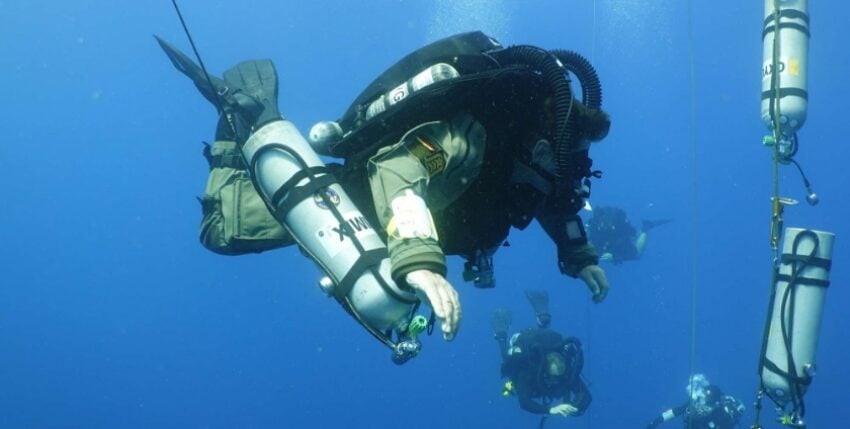Naval divers combine in-depth expertise with creative adaptability to act effectively even in unpredictable situations at depth. The Navy fulfils the high level of responsibility for these people and their equipment with the little-known Navy Diving Service Officer.
On 27 June 2006, a tragic diving accident occurred that led to a comprehensive review of the Bundeswehr's diving system. The Diving Accident Investigation Committee, headed by Captain Michael Brühn (then the navy's officer in charge of accident investigations), carried out a detailed investigation to identify the causes and risks and develop measures to improve diving safety. This analysis led to a holistic risk assessment of diving in the German Armed Forces. The risk assessment showed that different diving areas required specific adjustments in order to to eliminate weak points.
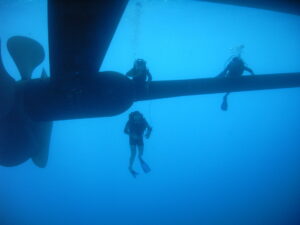
In November 2007, the so-called "Crash Crew" entrusted with the investigation recommended the establishment of a specialised supervisory body for the entire diving industry. It was to ensure the implementation of the "lessons learned" as a result of the risk assessment and centralise responsibility for the more than 500 divers at the time. Vice Admiral Wolfgang Edgar Nolting, the inspector of the navy at the time, then established the post of Navy Diving Officer (BeaTD) to ensure diving safety within the navy in the long term. The first BeaTD, Frigate Captain Ulrich Tschauder, was given the task of monitoring all aspects of the diving service, eliminating deficiencies and ensuring compliance with minimum training standards. This central role of the BeaTD is strengthened by close co-operation with various military and civilian institutions.
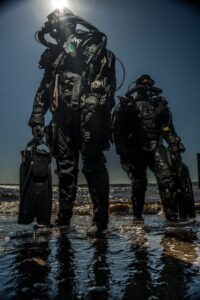
In terms of organisational structure, the BeaTD is part of the Naval Medical Institute of the Navy (SchiffMedInstM) in Kronshagen, but reports directly to the Inspector of the Navy. Since 9/2022, this activity has been carried out by FKpt Enghuber. The SchiffMedInstM is responsible for diving medicine for the entire German Armed Forces and is on call around the clock. In principle, the institute acts as a training and specialist centre for medical matters in the maritime sector and thus also supports the BeaTD in diving accident prevention and diving accident investigation.
The medical selection of divers at the SchiffMedInstM is based on suitability levels with extensive examinations and psychological tests to ensure that only suitable personnel are deployed in the diving service. This means that every diver is specially selected personnel, comparable to air force flying personnel. On average, around 1,500 diving examinations are carried out by the SchiffMedInstM each year.
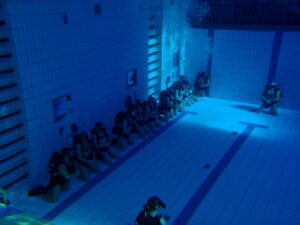
For swimming divers, the entry point into the navy's diving system, the Einsatzausbildungszentrum Schadensabwehr Marine (EAZS M) in Neustadt (Holstein) is the mother house of the divers. The divers also return here for training or further training. With up to 144 swimming divers every year, the EAZS M also lays the foundation for further training as combat swimmers, mine divers and ship divers in the respective organisations.
In general, the navy's diving service is highly attractive, with a stable number of applicants and an attractive additional salary as well as the trusting "small combat community". However, innovative approaches are also being pursued in order to continue to meet the demand for qualified personnel. These include direct entry opportunities into combat swimmer and mine diver training as well as internships in the troops. An outstanding example of unconventional training approaches is the deployment of Anna von Boetticher, Germany's most successful female freediver, who has enriched training in the navy. As a future-oriented line of action and continuous improvement of personnel coverage, the prerequisites for a separate diving speciality series (from which specialists such as ship divers, mine divers and combat swimmers emerge) are currently being examined. This could also increase the attractiveness of the Navy and better meet the current challenges of personnel recruitment.
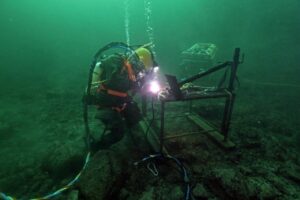
With the shift in focus to national and alliance defence, the German Navy's diving service faces major challenges with regard to the diversity of critical infrastructure in the territorial sea and contiguous zone. The BeaTD acts as a force enabler here by ensuring diving safety and supporting the seagoing units in monitoring the protection of undersea infrastructure. Its permanent field of activity is the planned regeneration of material and equipment, such as pressurised chambers, to ensure the emergency readiness of the divers. Influenced by the threat situation, however, the focus is currently shifting to efficient and accelerated procurement of equipment. In this context, the BeaTD is responsible for diving safety and, as the authorised representative (BV) and operations and supply manager (BVV), is in contact with eleven agencies within the Bundeswehr that are responsible for the further development, testing, inspection and procurement/management of diving equipment. The task is to procure and manage modern diving equipment for each specific capability-related, independent diving area. In 2024, new milestones were set here in the area of diving equipment, suits and equipment, for example to penetrate to greater depths with mixed gases. In addition, modern technologies such as Remotely Operated Vehicles (ROV) and Autonomous Underwater Vehicles (AUV) will be integrated into diving operations in the future. These systems offer new possibilities and comprehensive support in activities. However, they also harbour risks for divers that need to be carefully weighed up. This is another challenge that the navy will continue to face in the future with the BeaTD.
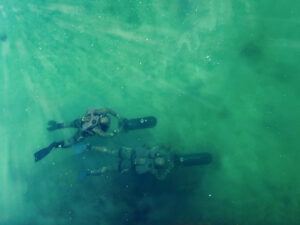
Scooter in open water, photo: Bw/PWT
Conclusion
To summarise, it can be said that the establishment of a special supervisory body for diving in the German Navy, the Navy Diving Service Commissioner (BeaTD), has not only improved the safety, training and equipment of divers in recent years, but has also strengthened the Navy as an employer by making diving more attractive in the competition for young talent.
Frigate Captain Ingo Mathe is a member of Crew 7/99, a qualified psychologist and combat swimmer. He is currently serving in the Diving Service Officer department at the Naval Medical Institute in Kronshagen.
Author: Ingo Mathe

